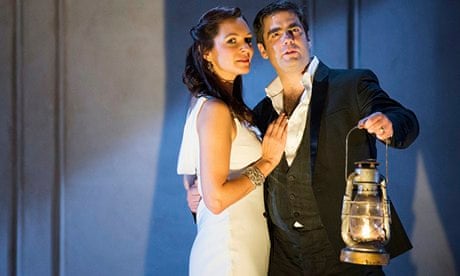First heard in Venice in 1649, Francesco Cavalli's Giasone – given as Jason by English Touring Opera – was the most popular Italian opera of the 17th century, performed Europe-wide and much imitated, until subsequent generations turned against it. Cavalli is one of music's greatest eroticists, though after his death, and until recently, his frankness was deemed offensive by many. Ambivalently analysing male sexuality and its consequences, Jason also plays fast and loose with classical narrative in ways that later ages, believing mythology to be sacrosanct, considered suspect.
Cavalli's starting point is Jason's wedding night with Medea in Colchis, prior to his theft of the Golden Fleece. Cavalli's glorious music suggests that Jason's sensuality is an irresistible, unstoppable force. But it also rapidly becomes apparent that he is a bigamist, who has dumped his first wife Isiphile and their children on the island of Lemnos, where the gods soon conveniently contrive to wreck his ship. A series of tragi-comic confrontations between the protagonists, under the watchful eyes of their servants and sidekicks, leads to eventual if uncertain resolution, but only after an alarming climax in which Isiphile exposes both her own obsessive nature and Jason's moral weakness by demanding he stab her to death, but spare her breasts so that their children can suckle from her corpse.
The opera is immensely long. No modern revival or recording has ever presented it complete, and ETO use a version – roughly half the score – prepared by the director Ronald Eyre for a Buxton festival revival in 1984. The first half feels bitty, as if too much is missing. But once we reach Lemnos after the interval, the almost Shakespearian collisions between comedy and intensity prove remarkably compelling.
Ted Huffman's straightforward production, designed by Samal Blak, plays itself out in a series of similar, white-panelled rooms that contrast chic Colchis with decrepit Lemnos. The costumes cleverly link art nouveau with 1980s new romantic: Jason (Clint Van der Linde) and his chum Hercules (Andrew Slater) look as if they might have strayed from Adam Ant's Prince Charming video. Van der Linde, with his silky countertenor, sounds glamorous as well as looks it, and by the end we fully understand why Hannah Pedley's self-assured Medea and Catrine Kirkman's desperate Isiphile are trapped in his orbit. Among the servants whose comments add multiple layers of irony to the drama, Piotr Lempa's bewildered Orestes and Peter Aisher's stammering Demus are particularly good. There's nice conducting from Joseph McHardy, too.

Comments (…)
Sign in or create your Guardian account to join the discussion